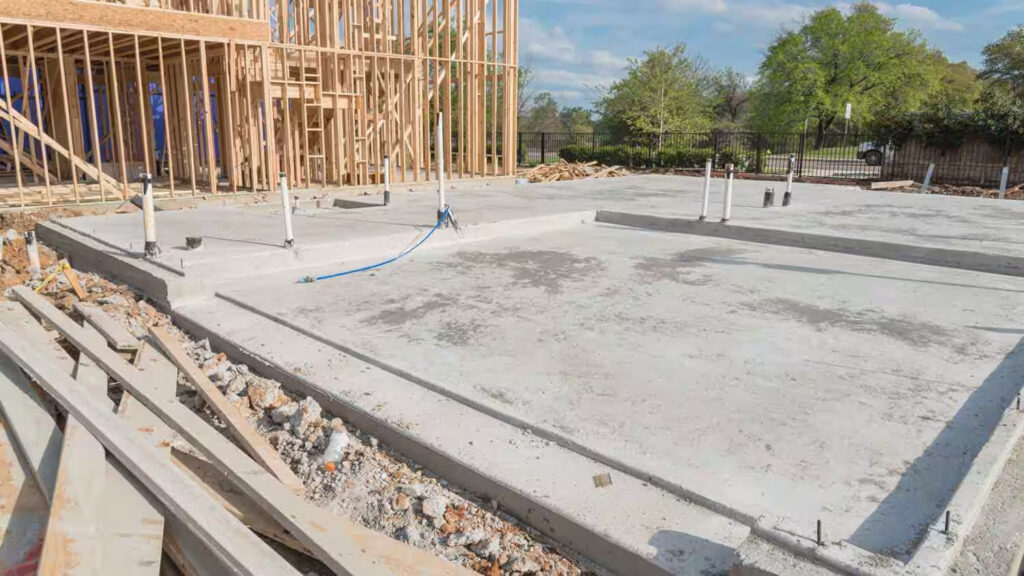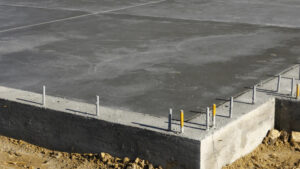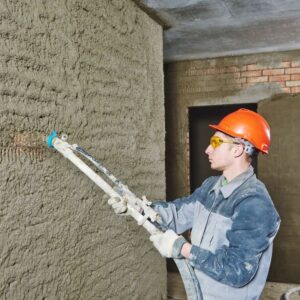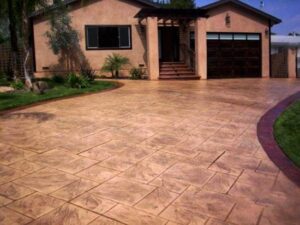- Blog
Strong Foundations: Exploring Concrete Foundation and Slabs in Deltona

A solid foundation is the cornerstone of any sturdy structure, and in the burgeoning real estate market, where new developments are on the rise, the role of concrete foundations and slabs in Deltona cannot be overstated. In this blog post, we will delve into the vital significance of robust foundations in construction, explore the various types of foundations commonly employed in Deltona, and shed light on the advantages of concrete as a building material. We’ll also guide you through the process of installation, discuss key considerations, and provide insights into maintaining these crucial elements of Deltona’s real estate landscape.
Definition of Foundation
Foundations in construction serve as the critical underpinning of any building, bearing the weight and distributing it evenly to the ground. Their significance lies in ensuring structural stability, preventing settlement, and safeguarding against environmental factors. A robust foundation not only supports the structure but also guarantees its endurance, playing a pivotal role in the creation of lasting and secure buildings.
Types of Foundations
Foundations are not one-size-fits-all; they vary to suit specific building requirements and environmental factors. In Deltona, where soil conditions and climate can differ significantly, choosing the right foundation type is crucial. The primary foundation types commonly used are:
Slab-on-Grade Foundations
Slab-on-grade foundations are a popular choice, especially in areas like Deltona with stable soil conditions. They consist of a single, thick concrete slab poured directly on the ground, providing an efficient, cost-effective, and energy-efficient foundation option, often preferred for single-story homes.
Crawl Space Foundations
Crawl space foundations elevate the home slightly above ground, creating a crawl space beneath. This design allows access for maintenance and utilities while providing some protection against moisture. Crawl space foundations are suitable for areas with occasional flooding or uneven terrain.
Basement Foundations
Basement foundations involve digging below ground level to create a full or partial underground space beneath the home. They offer valuable extra living or storage space, especially in regions with cold winters like Deltona. Basement foundations are versatile but can be more complex and costly to construct than other types.
Concrete as a Building Material
In the realm of construction, few materials rival the ubiquity and utility of concrete. Concrete is a versatile and widely used building material known for its durability and strength. Here are the key advantages of using concrete in construction:
- Strength and Durability: Concrete’s inherent strength ensures that structures can bear substantial loads, while its remarkable durability means that buildings constructed with concrete can stand the test of time, remaining resilient against wear and tear.

- Fire Resistance: Concrete’s non-combustible nature makes it an invaluable choice for constructing fire-resistant buildings. It acts as a shield against fire, enhancing safety and safeguarding structures from fire-related damage.
- Low Maintenance: Concrete’s resistance to rot, pests, and weathering results in minimal maintenance requirements. This quality reduces the need for frequent repairs, ultimately saving time and resources in the long run.
- Energy Efficiency: Concrete’s exceptional thermal mass properties contribute to energy-efficient construction. It stabilizes indoor temperatures, reducing the reliance on heating and cooling systems, leading to lower energy consumption and environmental benefits.
- Versatility: Concrete’s adaptability is a hallmark feature, allowing it to take on various forms and functions. From basic foundations to intricate architectural designs, concrete’s versatility enables it to suit a wide array of construction needs.
The Process of Installing a Concrete Foundation
The construction of a concrete foundation is a critical phase in building construction, ensuring stability and longevity. This step-by-step guide outlines the fundamental stages involved in this essential process.
1. Site Preparation
The process begins with thorough site preparation. This involves clearing the area of debris, excavating to the desired depth, and ensuring proper grading for drainage. The site must be level and well-compacted to provide a stable base for the foundation.
2. Formwork and Reinforcement
Next, formwork is erected to outline the shape and dimensions of the foundation. Reinforcement, typically in the form of steel rebar, is added to enhance the foundation’s strength and prevent cracking. The formwork and reinforcement act as molds for the concrete.
3. Pouring and Curing Concrete
Once the formwork and reinforcement are in place, concrete is poured into the mold. The concrete mix must meet the required specifications, and it is carefully poured to avoid voids or air pockets. After pouring, the concrete is left to cure, which involves maintaining proper moisture and temperature conditions to ensure it hardens uniformly and reaches its full strength.
4. Inspection and Quality Control
After the curing period, the foundation undergoes a thorough inspection to check for any defects or inconsistencies. Quality control measures are implemented to ensure the foundation meets structural and safety standards. Any necessary adjustments or repairs are made at this stage to ensure the foundation’s integrity.
Advantages of Slab Foundations

Slab foundations offer several advantages that make them a popular choice for construction in various regions, including Deltona. Here are the key advantages of slab foundations:
- Cost-Effective: Slab-on-grade foundations are often more budget-friendly compared to other foundation types, as they require fewer materials and less labor. This cost savings can be particularly appealing to homeowners and builders looking for economical options.
- Energy Efficiency: Slab foundations provide excellent thermal mass, helping to regulate indoor temperatures. In Deltona’s climate, this can lead to energy savings by reducing the need for excessive heating or cooling, ultimately lowering utility bills.
- Accessibility: Slab foundations create a single-level living space with no stairs, making them ideal for individuals with mobility challenges or those planning to age in place. This accessibility factor can enhance the long-term usability of a home.
- Resistance to Moisture: In Deltona’s humid climate, slab foundations can be advantageous because they are less susceptible to moisture-related issues like mold and mildew. Properly sealed and insulated slabs can help keep moisture at bay.
- Quick Construction: Slab foundations are relatively quick to install, which can accelerate the overall construction timeline. This speed can be beneficial for both builders and homeowners who want to move into their new homes sooner.
Challenges and Considerations
While foundations are essential for a building’s stability, they come with their set of challenges and considerations. Understanding these factors is crucial for successful construction and long-term reliability.
- Soil Conditions: The type and quality of the soil at the construction site can significantly impact foundation stability. Expansive or poorly compacted soils may require additional measures, like soil stabilization or deep foundations.
- Local Building Codes: Adhering to local building codes and regulations is crucial. Different areas may have specific requirements for foundation design, depth, and reinforcement to ensure structural integrity and safety.
- Water Management: Proper drainage is vital to prevent water accumulation around the foundation, which can lead to issues like erosion, moisture infiltration, and even foundation settling. Effective drainage systems must be in place.
- Environmental Factors: Climate and environmental conditions, such as extreme temperatures, seismic activity, or flooding, can affect foundation performance. Foundations in regions prone to earthquakes, for instance, may require special reinforcement.
- Cost Considerations: Concrete foundations can be a significant portion of construction costs. Budget constraints must be carefully managed, taking into account factors like excavation, materials, labor, and potential unforeseen issues during construction.
Choosing the Right Professionals
Choosing the right professionals for your concrete foundation and slab project in Deltona is crucial for ensuring the structural integrity and longevity of your building. Here are some key steps to help you make an informed decision:
- Research Local Contractors: Start by researching and compiling a list of reputable contractors in the Deltona area who specialize in concrete foundations and slabs. You can do this by asking for recommendations from friends, family, or neighbors, or by searching online and checking local business directories.
- Check Credentials: Verify the credentials and qualifications of the contractors on your list. Ensure they are licensed and insured to work in Deltona. A valid license demonstrates that they have met the necessary regulatory standards.
- Review Past Work: Request references and portfolios of their previous concrete foundation and slab projects. Reviewing their past work will give you a sense of their expertise and the quality of their craftsmanship.
- Request Multiple Quotes: Obtain detailed quotes from multiple contractors. These quotes should include a breakdown of costs, materials, project timelines, and any warranties offered. Comparing quotes will help you identify competitive pricing and value-added services.
- Check for Permits: Ensure that the contractor is knowledgeable about local building codes and permits required for your project in Deltona. A reputable professional will guide you through the permitting process.
Maintaining Concrete Foundations
Maintaining concrete foundations is essential for the long-term stability of your Deltona property. Regular inspections, typically twice a year, can help detect any early signs of cracks, settlement, or water damage. Promptly address any issues by filling cracks with epoxy or polyurethane sealants, ensuring proper drainage to prevent moisture buildup, and maintaining a consistent moisture level in the soil around the foundation. Additionally, consult with a professional if you notice any significant structural concerns to prevent further damage and maintain the durability of your concrete foundation.
A strong foundation is the cornerstone of every enduring structure in Deltona, and understanding the importance of concrete foundations and slabs is vital in ensuring the stability and longevity of your property. Whether you’re embarking on a new construction project or need maintenance and repair for an existing foundation, making informed decisions and selecting the right professionals is paramount.
For expert guidance and assistance tailored to your specific needs, don’t hesitate to reach out to us today. Contact us or visit our website to take the first step toward building a solid foundation for your Deltona property’s future.

Our Latest Post

Building Dreams: Deltona’s Leading Concrete Contractors
Home Blog Building Dreams: Deltona’s Leading Concrete Contractors In the vibrant city of Deltona, Florida, where dreams are nurtured and visions come to life, the

Transform Your Space: Top Concrete Contractors in Deltona
Home Blog Transform Your Space: Top Concrete Contractors in Deltona In the realm of home improvement and construction, few materials offer the versatility, durability, and

Expert Concrete Solutions: Deltona’s Premier Contractors Unveiled
Home Blog Expert Concrete Solutions: Deltona’s Premier Contractors Unveiled In the realm of construction and home improvement, concrete stands as a versatile and durable material,

Your Vision, Our Expertise: Deltona’s Premier Concrete Contractors
Home Blog Your Vision, Our Expertise: Deltona’s Premier Concrete Contractors In the vibrant city of Deltona, Florida, where innovation meets tradition and modernity blends seamlessly

Safe and Stylish: Enhance Your Home with Concrete Walkways & Stairs in Deltona
Home Blog Safe and Stylish: Enhance Your Home with Concrete Walkways & Stairs in Deltona Have you ever wondered how the paths we walk and

Transforming Your Deltona Property: The Beauty of Stamped Concrete
Home Blog Transforming Your Deltona Property: The Beauty of Stamped Concrete Deltona property can undergo a remarkable transformation – all thanks to the exquisite allure
